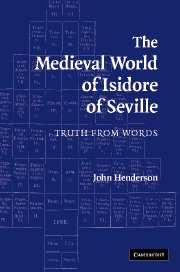
John Henderson, The Medieval World of Isidore of Seville. Truth from Words. Cambridge: Cambridge University Press, 2007, xi-232p.
- ISBN 978-0-521-86740-5
- $99.00.
Compte rendu dans Bryn Mawr Classical Review (2009.01.45) par Marco Formisano (Humboldt University and Columbia University)
Extraits en ligne:
Présentation de l'éditeur:
In his Etymologiae, St Isidore ofSeville put together a systematic survey of the world in the form of avast thesaurus of Latin vocabulary, which supplies a more or lessaccepted or fanciful etymology for each term. It became one of the mostinfluential books of European culture through the whole medievalperiod. This Latin 'Roget' is traditionally used as a reference work,accessed through an elaborate index system. In this book ProfessorHenderson, the most challenging critic writing on Latin literature andRoman culture today, presents the first full reading of all twentybooks of the Etymologiae, showing how the material is sequenced so thatits reader is treated to a thorough-going education in the world as itwas apprehended in Jewish, Graeco-Roman and Christian culture. AllLatin, including etymologies, is translated.
• The first book tooffer a reading of the whole of the Etymologiae, the Latin power bookthat delivered the classical-Christian world to the Middle Ages •Translates all Latin, including the etymologies, for which a full indexis provided • Written by one of the leading critics of Latin literatureand Roman culture
table:
Preface: when it's ajar; PartI. Preliminaries: 1.1. Prefatory correspondence and dedication; 1.2.Index and referencing system; 1.3. Conclusion; Part II. Reading theEtymologiae: 2. Primary education; 2.1. Proem: seven at one blow;2.1.1. Grammar: the alphabet; 2.1.2. Grammar proper; 2.2. Rhetoric;2.3. Dialectic or rationalist philosophy; 3. Secondary education;3.1.Poly-mathematics: quadrophenia; 3.2. Arithmetic; 3.3. Geometry;3.4. Music; 3.5. Astronomy domine; 3.6~4. Medicine; 5. Law and history;6. Scripture and Christian duties; 7. God, the angels, the saints; 8.Church, schism, paganism; 9. Languages, populations, societies; 10.Epithets: a thesaurus; 11. Mankind and monsters; 12. Living creatures;13. World survey (water); 14. Earth survey (land); 15. Building, townand country; 16. Rocks and metals; 17. Agriculture and botany; 18. Warand recreation; 19. Ships, construction and decoration, clothing; 20.Food and drink, packaging and transport, tools and harness; Conclusion:after words; Appendix 1. W. M. Lindsay and the scholarship on Isidore;Appendix 2. Isidore's chronographic table (Etymologiae 5.39).